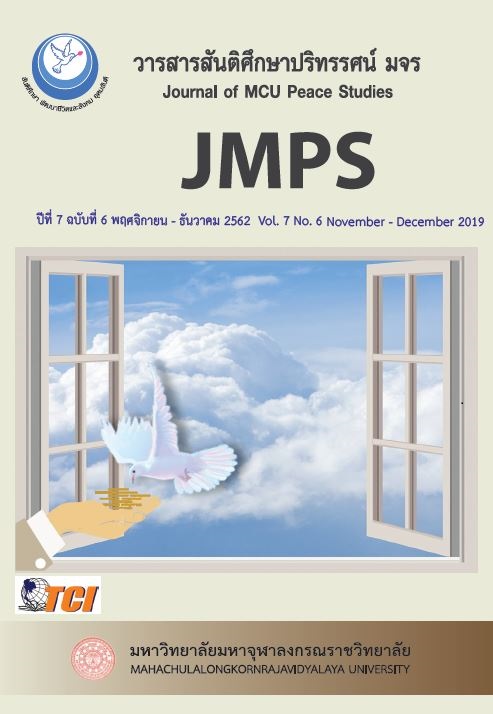รูปแบบการเสริมสร้างการจัดการการเรียนการสอนวิชาวิทยาศาสตร์ของสถานศึกษาขั้นพื้นฐานระดับมัธยมศึกษา กรุงเทพมหานคร
Main Article Content
บทคัดย่อ
การวิจัยนี้มีวัตถุประสงค์เพื่อ 1) ศึกษาสภาพปัจจุบันในการจัดการเรียนการสอนวิชาวิทยาศาสตร์ในระดับมัธยมศึกษา เขตกรุงเทพมหานคร 2) ศึกษาปัจจัยที่มีผลต่อการพัฒนาทักษะการเรียนการสอนวิชาวิทยาศาสตร์ในระดับมัธยมศึกษา และ 3) เสนอแนวทางการพัฒนาทักษะการเรียนวิชาวิทยาศาสตร์ในการจัดการศึกษาขั้นพื้นฐานระดับมัธยมศึกษา เขตกรุงเทพมหานคร วิธีวิจัยใช้เชิงปริมาณ จำนวนทั้งหมด 205 โรงเรียน รวม 410 คน เครื่องมือที่ใช้ในการเก็บข้อมูล คือ แบบสอบถาม และวิธีการสัมภาษณ์ ผลการวิจัยพบว่า 1. สภาพการปฏิบัติงานด้านการจัดการเรียนการสอนวิชาวิทยาศาสตร์ มีการปฏิบัติงานตามแนวคิดการจัดการเรียนการสอนวิทยาศาสตร์ 12 ด้าน และมีรูปแบบการปฏิบัติงานในปัจจุบันอยู่ในระดับมาทุกประเด็น เช่น ด้านการจัดการเรียนการสอนวิชาวิทยาศาสตร์ ด้านการจัดกิจกรรมการออกแบบการเรียนรู้ ด้านบทบาทของผู้บริหารสถานศึกษา ด้านแหล่งการเรียนรู้ ด้านเกณฑ์การวัดและประเมินผล และอื่นๆ ตามลำดับ 2. ปัจจัยที่มีผลต่อการพัฒนาทักษะการเรียนการสอนวิชาวิทยาศาสตร์ พบว่า มี 4 ปัจจัย ได้แก่ 1) ปัจจัยด้านการจัดการเรียนการสอนวิชาวิทยาศาสตร์ 2) ปัจจัยด้านผู้เรียน 3) ปัจจัยด้านสถานศึกษา และ 4) ปัจจัยด้านทักษะทางวิทยาศาสตร์ 3. แนวทางการพัฒนาทักษะการเรียนการสอนทางด้านวิทยาศาสตร์ พบว่า ผู้บริหารมีส่วนสำคัญในการส่งเสริมการจัดกิจกรรมทางวิทยาศาสตร์ ผู้สอนควรเน้นการใช้คำถามเพื่อส่งเสริมกระบวนการคิด ให้นักเรียนได้มีการปฏิบัติงานจริง เกิดเจตคติทางด้านวิทยาศาสตร์ที่ผู้เรียนเห็นประโยชน์ในการเรียน และสามารถนำความรู้ที่ผ่านการวิเคราะห์มาผสมผสานไปประยุกต์ใช้สร้างสิ่งใหม่ที่มีลักษณะต่างจากเดิมได้
Article Details
ทัศนะและความคิดเห็นที่ปรากฏในบทความในวารสาร ถือเป็นความรับผิดชอบของผู้เขียนบทความนั้น และไม่ถือเป็นทัศนะและความรับผิดชอบของกองบรรณาธิการ ยินยอมว่าบทความเป็นลิขสิทธิ์ของวารสาร
เอกสารอ้างอิง
Baylor, D., Samsonov, P., & Smith, N. (1999). Constructivism Theory, Retrieved January 31, 2014, from https://kwamwang.files.wordpress.com/2012/01/constructivism.doc.
Boonlar, T. (2002). Educational Quality Criteria for Excellence Operations 2002: "Vision to Build the World" Increase Productivity. Published in Magazine, King Mongkut's Institute of Technology North Bangkok. 40(3), 17-22.
Dechakhupt, P. (2007). Teaching-centered learners. Bangkok: The Master Group, Towermount.
Deenonpho, S. (2011). The Causal Factors Influencing Science Learning Achievement of Matthayomsueksa 3 Students Secondary Educational Service Area Office 30, Chaiyaphum Rajabhat University.
Drucker, P. F. (1993). Post-capitalist society. New York: Harper Business. Environmental Science. (Lord, T.R., 1999: p 22), Indiana University of Pennsylvania Indiana, PA.
Elen H.,& Ed, D. (1997). Using constructivist teaching strategies in high school. Science Classrooms to cultivate positive attitudes toward science, University of Nevada, Reno.
Institute for the Promotion of Teaching Science and Technology, Ministry of Education. (1996). Annual Report 1996 Institute for the Promotion of Teaching Science and Technology (IPST). Bangkok: Institute for the Promotion of Teaching Science and Technology Ministry of Education.
Jamornmann, U. (2000). A Research and Development of Indicators, Criteria and Techniques for IInternal and External Assessment in Thai Universities. Bangkok: Funny Publishing.
Koh, K., & Lee, A. (2007). The Quality of Teachers’ Assessment Tasks and Student Work in the Singapore Science Classrooms. Singapore: Nanyang Technological University.
Kaewurai, W. (1998). The Development of the Instructional Model for General Methods of Teaching. Subject Emphasizing Cases to Enhance Teacher Students’ Reflective Thinking Ability in the Science of Teaching. Bangkok: Chulalongkorn University.
Lord, T.R. (1999). A Comparison Between Traditional and Constructivist Teaching in Pak Tee Ng. (2007).Ministry of Education, Singapore, 7(1), 5-15.
Ministry of Education, Department of Academic Resources. (2008). Core Education Curriculum.
Phramaha Boonserm Thammamintino (Thongsri). (2011). Factors and effectiveness of academic Administration Nakornratchasathanon Fort School, under the Office of Samutprakarn Educational Area 1 Department of Educational Administration, Mahachulalong kornrajavidyalaya University.
Petchkaew, R. (2002). Development of a teacher empowerment model for educational institutions transferred from the Office of the Basic Education Commission to Local Administration Organizations. Bangkok: Chulalongkorn University.
Sanchez, G., & Art Home Online. (2018). How is science important to this life?, Retrieved June 30, 2018, from https://arthomeonline.org/category/A7.html.
Siripunkaw, P. translated and adapted from Bronoski (1972), Diederich (1967), Whaley & Surratt (1967). 20 scientific attitudes, The Kansas School Naturalist, 35(4).
TCIJ. (2013). Fiscal year Accelerate teacher reform - teaching system. Retrieved September 4, 2013, from https://www.tcijthai.com/news/2013/04/scoop/3036.
Thongchumnum, P. (2004). Elementary science teaching. Bangkok: Odeonstore.
Wongboonsin, P. (2006). Comparative research on education reform of ASEAN countries. Research report of the Secretariat, Bangkok.
Udom, P. (2010). Evaluation of science teacher standards in basic education institutions in Songkla Province. Prince of Songkla University, Pattani Campus, (1), 65-77.


